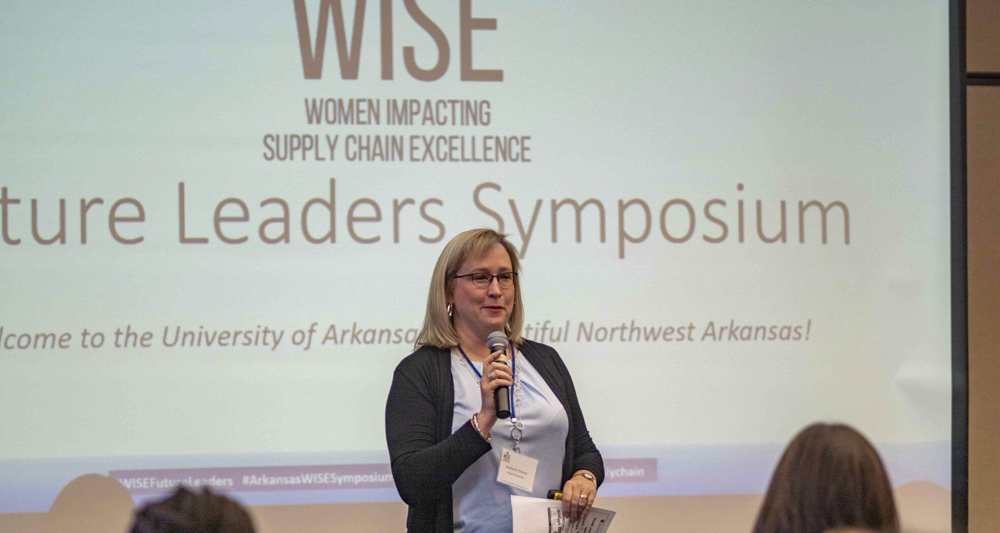How I Became A Woman in Supply Chain

November 12, 2019 | By Stephanie P. Thomas
During my childhood, I played with my younger brother’s trucks, trains and planes (in the spirit of full disclosure, he also played with my dolls). I’d love to tell you that this was the foundation for my passion for logistics and supply chain management, but it wasn’t. Like many students that enter my classroom today, I didn’t know anything about this part of business. However, this is where I would find my passion and success. How did that happen?
As an undergraduate at the University of Tennessee, Knoxville, in the mid-90s, I was an undecided major for as long as possible because I wasn’t sure what I wanted to do. Plan A was to be a pharmacist, but freshman chemistry and calculus inspired me to explore other options. Without a Plan B, I did what many other students do, I sought advice from friends and family.
After a phenomenal sales job by my roommate, I declared speech communication as my major (shout out to my fellow Speech Comm classmate Peyton Manning – highest paid speech comm major of all time thus skewing the average starting salary forever), but I also added a business minor. My parents, especially my Dad, told me I could major in whatever I wanted, but I had to minor in business. I was told that was practical. So, that’s what I did.
In Spring 1997, I was introduced to the world of Supply Chain Management through L&T 302: Introduction to Transportation. At that time, the term supply chain management wasn’t being widely used much yet (favoring Logistics and Transportation). This introduction was lackluster. Looking back, I remember precisely two things from that semester. First, my professor had spent his career prior to academia working for one of the railroads and his lectures did nothing to inspire a love of transportation. Second, one of my sorority sisters came up with hand motions to help us remember the difference between “piggyback” and “double-stack” when studying for one of our exams. Terms I pretty much never had to use in practice but have been permanently burned into my brain.
Not exactly life-altering.
I decided to pursue my MBA because even if I hadn’t found my passion yet, I had found that I enjoyed my business courses and excelled in them. I elected to get a dual concentration in marketing and logistics and transportation with my degree. I chose logistics and transportation for a solely practical reason. I was at a top ranked L&T program so I thought the abundance of recruiters would increase my odds of getting a job and not having to move back home after graduation. However, this time my experience was different.
Along the way, I fell in love (and not just with my future husband). Beyond my practical desire to get a job after graduation, I found an intriguing mix of art and science in this area of business. It appealed to both my right and left-brain strengths. I honed my analytical skills but didn’t have to sacrifice or ignore my creative side. I went on to work in a distribution center for Stanley Tools, purchasing for IBM and logistics and merchandising for Lowe’s. I loved the challenges of supply chain management. I loved that no two days were ever the same. I loved building relationship. And I loved being able to quantify the financial impact of my decisions.
I had found my passion.
In the early 2000s, I didn’t even realize that I was a “girl in supply chain.” My MBA class had been predominantly male and most of my bosses were male, but that was never a big deal to me. I had female co-workers and knew females in leadership roles. I also had male bosses who didn’t “treat me like a girl,” but I also never expected them to. I wanted to be the best employee that I could be, not the best female employee. In return for my hard work, my bosses mentored me and offered tremendous opportunities.
Now, years later, I’ve refocused my logistics and supply chain management passion into an academic career. Given the environment of today’s workplace, I am more aware of being a woman in supply chain management than I was earlier in my career. Female supply chain Ph.D.s are still relatively scarce, and I am often the sole female in a department, meeting or on a committee. I am also highly aware of the percentage of women pursuing supply chain degrees and the diversity initiatives that organizations are trying to address. Gender in supply chain is under a microscope.
So, why am I sharing this story? I love supply chain management and love inspiring students to pursue supply chain careers. In some ways, not much has changed at the university level related to recruiting students into the field. Few students are entering college and declaring supply chain as their major. Most students still don’t know what it is. However, supply chain concepts strike the right chord with many students – regardless of gender. There is an increasing need to fill the talent pipeline. As a field, supply chain management needs to emerge from being the best kept secret in the business school. Job opportunities are abundant and offer tremendous variety. Intuitively, male students often click with supply chain management as a career choice more easily than females. At the university level, female students don’t always have access to female professors with relevant experience that can serve as role models and break the misconception that this is just a man’s job for working with truck drivers or in a warehouse.
While I spend my time today teaching supply chain instead of doing supply chain, I am still passionate about the opportunities available and love seeing students find their passion and get excited about their future careers. I will continue to introduce this dynamic and exciting world of business to the students that enter my classroom doors with the hope that many will find their passion here. We need to fill the supply chain pipeline with the best talent that business schools offer, and as a former female supply chain professional, I will continue to work to increase the percentage of females that like me find their passion in the world of logistics and supply chain management.

